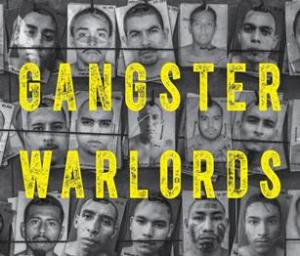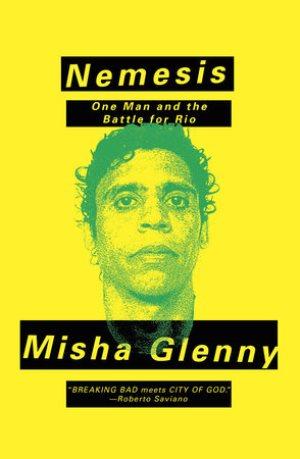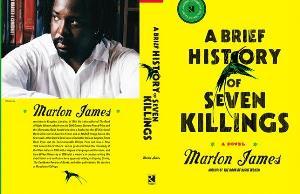This article was produced in collaboration with AlterNet and first appeared here.
Ioan Grillo, Gangster Warlords: Drug Dollars, Killing Fields, and the New Politics of Latin America (2016, Bloomsbury Press, 377 pp., $28.00 HB)
Misha Glenny, Nemesis: One Man and the Battle for Rio (2016, Alfred E. Knopf, 293 pp., $27.95 HB)
Marlon James, A Brief History of Seven Killings (2014, Riverhead Press, 688 pp., $28.95 HB)

But the violence hasn't stopped -- it has only been displaced from the sphere of politics to the sphere of criminality. As Ioan Grillo notes early on in Gangster Warlords, his sterling reportage on the leaders of the powerful of Latin American crime organizations, more than a million people have died in the criminal conflicts (and state response to them) around these groupings.
The so-called cartels in Mexico, their brethren in Colombia, the "posses" of Jamaica, the criminal "commands" of Brazil, and the transnational gangsters of Mara Salvatrucha are all in Grillo's sights as examples of a new, and deeply disturbing, form of crime, largely unmoored from ideological struggle yet acting as parallel power or alternative to the state. Whether it's the government yards of Trenchtown, the favelas of Rio and Sao Paulo, the mean streets of Tegucigalpa and San Salvador, or the fields of western Mexico, national governments have effectively ceded control of huge segments of the population to criminal overlords.
In Rio de Janiero alone, more than two million people live in the favelas, the unsanctioned, unsupported, and poverty stricken communities crawling up the hillsides above the Copacabana and the city's other glorious beaches. There, the presence of the state is almost nil, except for the occasional intrusions of police or military raiding parties, the formal power is in residents' associations, but the real power is almost always the crime overlord.
And bizarrely enough, those Brazilian crime lords are as strong and organized as they are because of a fateful decision by the military dictatorship back in the 1970s, when the generals, in all their wisdom, decided to punish imprisoned leftist guerrillas by putting them in the general prison population with Rio's criminal masterminds. Grillo interviews some of the hard men behind what became the Red Command (Comando Vermelho), the largest and most powerful of the criminal gangs, unraveling that fateful decision decades ago and unspooling the consequences that still play out today.
The imprisoned guerrillas imbued the criminals with a Marxian social critique and their habits of political organization, and the criminals applied those lessons well in building their organizations. The nascent alliance between the left and the lumpenproletariat fell apart when the ex-guerrillas won amnesties and began political careers (they were white), leaving their darker hued criminal compatriots to their own devices. Now, all that's left is the organizational ability, along with some limited social solidarity in the form of Robin Hoodism -- stealing from the rich to give to the poor, at least to the degree that the commands provide services and goods to the poor in their districts.
Relations between the commands and the state are complex, intricate, and finely balanced -- or else there could be real trouble. While generally content to be left to run their affairs in their favela strongholds, the commands have repeatedly, and spectacularly, shown they have the ability to bring serious mayhem down from the hills to the "asphalt," as the poor refer to the thriving city that surrounds them.
When Sao Paulo's First Capital Command, the largest criminal organization in the country, grew unhappy with the government -- or more precisely, with the police -- in 2006, it unleashed a wave of attacks that unnerved the city, with assaults on police stations and buses burned on city streets. It did the same thing again six years later, complaining that cowardly police were killing its members and responding by executing one or two police officers every day for a month until suddenly and without explanation stopping. Maybe the command figured the cops had gotten the message.
As Grillo reports, when the commands killed 139 police in a burst of mayhem, the whole world took horrified note. The more than 500 killings committed by police in the days that followed didn't make the global news.
It's worth mentioning that the number of killings by trigger-happy police in the US has risen to the level of national political discourse, American cops are like school crossing guards compared to their bloody-handed brethren in places like Brazil and Jamaica. Indeed, as here in the US, the thuggery of the state's agents leads to festering hatreds and their being seen as if they were an occupying army, only more so.
Grillo reports similar intricate relationships between the criminals and the state in Jamaica, where the leaders of the neighborhood "posses" in tough neighborhoods like West Kingston become intermediaries between residents and the state, which, again, is generally absent except in the form of the police and military. Posse leaders and their paramilitarized gangs work with competing political factions, who cede effective responsibility and control for votes at election time.
In all the cases, the trade in prohibited drugs is providing the oxygen that the criminal organizations breathe. Brazil's favelas are the ground zero of the retail cocaine trade in the world's second largest cocaine market, where the nice, white, middle-class kids of the city go to score and dance the night away at favela funk balls. In Jamaica, the neighborhood gangs of the 1970s metastasized into powerful and deadly posses with international reach thanks to the cocaine trade. And in Mexico and Central America, it is again the cocaine traffic that has enabled what were once ma-and-pa smuggling operations and neighborhood street gangs to morph into the cruelly violent cartels of today.
Grillo, along with policymakers throughout the hemisphere, doesn't know quite what to make of this phenomenon. These groups are not simply gangs, and they're not guerrillas. Grillo calls them "criminal militias," which is as good a phrase as any, but simply naming them isn't making it any easier for governments to figure out how to deal with them.

Like Grillo, Glenny does extensive interviews, including hours' worth with Nem over a period of years, as well as favela residents, gang members, police, politicians, and analysts, and he is able to shed considerable light on the shadowy interconnections between the powers that be in the favela and the various police forces, most of which are thuggish and corrupt, as well as the politicians that reach out to favela voters at election time.
Along the way, he opens a window on the class and race stratification pervasive in Brazil, but also shows how the gang lords make the favelas work for their residents. It is the gang lords who donate food and clothing to the poorest, provide security for all (at the price of outbreaks of exemplary violence aimed at lawbreakers like rapists and murderers), and even take over the administration of "justice" in the areas they control.
Nem's story is a classic favela crime lord tale. Born poor, he quit school in order to earn his keep, got work in the legitimate service economy, got married, had a child, and was on the path to the straight and narrow when his daughter's illness forced him to turn to the local crime boss to pay for her treatment. That led to working for the boss to pay off his debt, and that in turn led to his march to the top (however briefly) of the criminal command.
Unlike many of his peers, who were uneducated and largely uninterested in conventional life, Nem had management and accounting skills, and the kind of temperament that led him to negotiate conflict when possible and avoid indiscriminate violence. In an ideal world, he might have been a Payless Shoe Store manager. Instead he became a crime lord.
The reporting from Glenny and Grillo is mind-bending and terrifying, rich in detail and nuance, and both books come highly recommended. But neither seem to fully confront the role of drug prohibition within poverty-stricken, highly unequal countries. Grillo at least devotes a few pages at the end of his book to denouncing the drug war, but Glenny seems to just take it, and the social injustices of late Latin American capitalism, as givens. He shines a bright line of them, but really has nothing to say about them. That's too bad.
A Brief History of Seven Killings is not reportage, it is fiction, thinly-veiled, but is included here because fine literature can educate and illuminate as well as the finest journalism. Kingston-born Marlon James won the prestigious Booker Prize for this sprawling, horrifying, and intensely rich novel centered around the attempted assassination of reggae superstar Bob Marley in 1976.
James treads some of the same ground as Grillo, who reported on the Shower Posse and its leader, "Jim Brown," whose son, Dudus Coke, was the object of a military raid on the Tivoli Gardens shantytown that left 73 dead in 2010. "Jim Brown," Dudus Coke, and other real life posse leaders are barely fictionalized in James' work, which follows their ascent from local bosses to fearsome international crime bosses thanks to Colombian cocaine.

But the attempted murder of Marley, who was seen as a Manley supporter ("Rasta don't work for no CIA," he sang), by gunmen working for a posse leader allied with Seaga, and the fates of those who ordered and carried out the failed hit, are only part one of the novel. In part two, James follows the posses from their two-bit shantytown kingdoms to their rise as global, and brutal, players in the burgeoning US cocaine markets of the 1980s and 1990s.
It isn't pretty. In fact, the craziness (much of drug induced, some of it deprivation-induced) and the wanton brutality, the glaring sexism and homophobia of Jamaican yardie life can make for some difficult reading. But you don't learn about ugly things by only looking at pretty ones.
"Seriously, Alex, prison library serious to fuck," says a posse leader imprisoned in the US. "Me go to plenty library in Jamaica and not one have book like the number of books me see in Rikers. One of them is this book Middle Passage. Some coolie write it, V.S. Naipaul. Brethren, the man say West Kingston is a place so fucking bad that you can't even take a picture of it, because the beauty of the photographic process lies to you as to just how ugly it really is. Oh you read it? Trust me, even him have it wrong. The beauty of how him write that sentence still lie to you as to how ugly it is. It so ugly it shouldn't produce no pretty sentence, ever."
Marcus James can write some pretty sentences, but they serve to make the ugly even uglier. And the reality, whether it's Kingston or Rio or San Salvador or Michoacan, is pretty ugly. Grillo, Glenny, and James don't let us turn our eyes away from the festering sores, and that's a good thing. We need to try to understand what is going on. Because it's crazy down there.
Add new comment